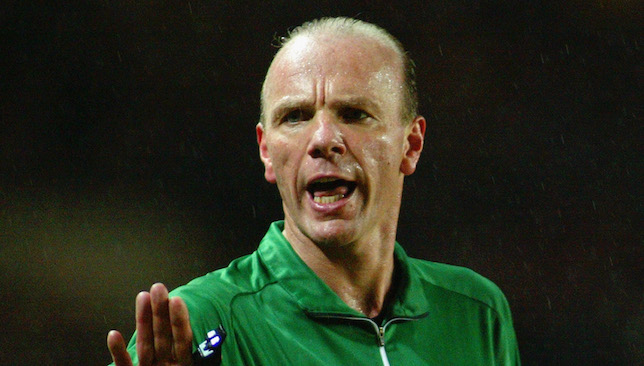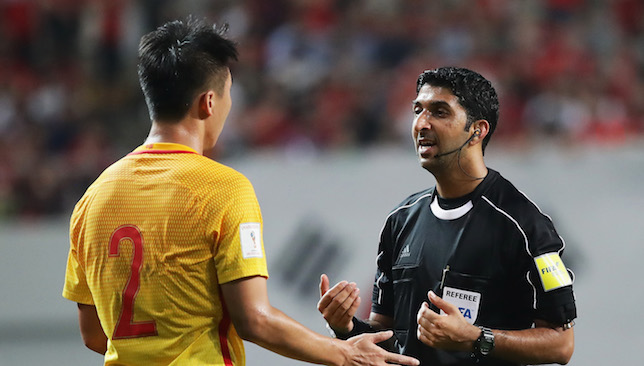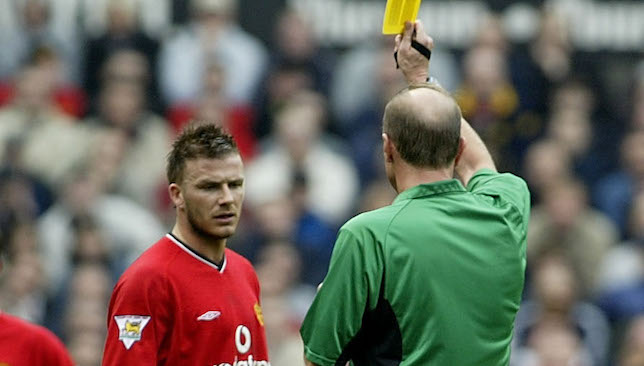
A man who has officiated more than 250 Premier League matches is set to guide the career of elite Emirati whistleblowers.
Steve Bennett, 55, has just completed the second week of his new job as the UAE Football Association’s refereeing technical director. The role will see him utilise the extensive experience gained overseeing the English top-flight’s superstars, UEFA Champions League matches, FA Cup finals and international games across the globe prior to his retirement six years ago.
Speaking to Sport360 from behind his desk at the Al Khawaneej headquarters, he expanded on his methodical approach to referee coaching, treasured memories of a high-profile career and attitude towards video technology.
I finished refereeing in England (in 2010) and then became a senior FIFA Technical Referee Instructor. I ended up travelling here, there and everywhere. I was working a lot in Africa, the Pacific Islands, in Europe and parts of Asia and you cross paths with so many people.
They (UAE FA) tried to entice me last October, but it wasn’t quite right timing-wise. I politely declined, then continued working with FIFA. Then this summer they had their training camp in Germany and I was working with the UAE referees for a week. It made me wonder what was going on there now?
I was about to go back and then somebody said to me, ‘what do you reckon?’ Lots of negotiations followed and now here I am. It is a big challenge ahead.
It is getting to know the culture and the way they operate. I will give it a few weeks to see how things go.
I have seen several matches now. We’ve had debriefing meetings with the referees, cutting up all the clips and finding out about all the incidents. We’ve talked about them and have seen whether we can move in the direction of consistency. They are small things.
We want them and will teach them to be in the best-possible position to make a judgement. You always have to be on the move. They are human. Players make thousands of mistakes, but they are not over scrutinised. Our aim is to make sure they are super-fit, as you must be an athlete. You need to be technically aware and manage the game. We’ll be working on this week-in, week-out.
They are in a good place. We have a World Cup-candidate with Mohammed Abdulla Hassan. Therefore, we have to support him like we support all the others.

Progressing well: Mohammed Abdulla Hassan.
Maybe there will be more time we devote to him and his assistants, looking at videos and looking at performances in really fine detail. You have to make an impression.
I certainly intend to meet up with Howard, I’m sure he will come over to Dubai and we’ll discuss some things. Maybe we can arrange some things which can benefit referees between us. It is about working together. He’s not given me any particular tips. He’s told me to enjoy the lifestyle and we always stay in touch, anyway.
It was a complete accident. I was teaching and also played a very high level of cricket, county seconds and representative cricket for Kent.
I passed the referees’ examinations in 1984 and it was just to keep the parents off my back.

David Beckham receives a yellow card from Steve Bennett.
I was a FIFA referee, I am one of only two who has done three FA Cup finals, many international games such as Brazil v Argentina, the Qatar Emir Cup and even officiated in the Himalayas. It has been vast and great. I am so glad I took those examinations.
That was an incredible situation. Within 10 minute he had put a tackle in on Scholesy (Paul Scholes), easy yellow card. He was then in my face every time after that. I had 75,000 fans and millions of people on TV watching.
You have to sell your decisions properly, so I just thought I need to wait for my moment. It was difficult to manage.
Just before halftime, Fernando Torres was fouled and I could see him running over. I understand Rafa Benitez and Steven Gerrard were yelling ‘no’ at him, they knew. I kept walking towards the tunnel and a second yellow card was produced.
I had emails from people I hadn’t even heard of across football thanking me for getting hold of the players. It made me feel better, it was a big moment in which people realised you have to be strong as a referee.
There was also ‘Pizzagate’ between Manchester United and Arsenal in 2004 which led to a lengthy list of suspensions for the players. What was that like?
There was a late penalty and thankfully I was correct to give it, as it was a tough decision. The ball hits the crossbar and I am gone, I did not know what Martin Keown had done (provoking Ruud van Nistelrooy). All the players lost it and at the end of the game, it got worse. I missed all the stuff in the tunnel, so you just report what you see.I believe the players let football down that day.
I like technologies which are for matters of fact, such as whether the ball has crossed the line. Goal-line technology has helped a great deal and has taken away the controversial debate of whether a goal has been scored or not.
Here in the UAE, I believe they had additional assistants behind the goal last season which certainly acted as a deterrent with regard to holding and pushing inside the penalty areas. They have now taken this away, so referees will have to be more aware of potential problems.
Referees and assistant referees currently use the communication system in the Arabian Gulf League; all officials are linked up and this is a good tool to assist with teamwork.
FIFA are trialing other technologies and its feasible that in the future we will see more of this introduced into the laws of the game, to assist the match officials even further.